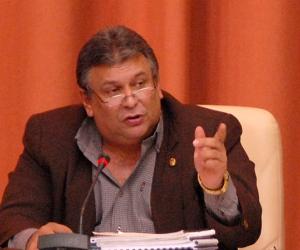Cuba Is Not Privatizing its Economy
- Submitted by: lena campos
- Business and Economy
- 10 / 15 / 2013

Marino Murillo, the so-called "czar" of the Cuban economic reforms. “It is not correct to say that in Cuba today a transformation of government property into private property is taking place,” said Marino Murillo.
Cuba is not turning its state-owned-and-managed property into private property, says economics czar Marino Murillo.
Addressing Cuba’s National Assembly of Popular Power, the head of the Commission on Implementation and Development of the Guidelines made several important points about the reforms in the nation’s economic structure that are known as “actualization” or updates.
The address was delivered on July 7 but was publicized this week by the official website Cubadebate to coincide with the opening of the First International Congress on Economic Management and Development being held in Havana.
Cubadebate presents the speech as “excerpts, an encapsulated version of the statements” by Murillo. The summary carries “no exact quotes, so as to better inform” the members of ANEC, the National Association of Economists and Accountants of Cuba, which is hosting the Congress. The translation below is by Progreso Semanal.
Among the statements attributed to Murillo by Cubadebate:
“It is not correct to say that in Cuba today a transformation of government property into private property is taking place. The actualization of the Cuban economic model presupposes, above all, that social property is above the basic means of production. To actualize the model does not change the structural foundation of property over the basic means of production. A change in property is not taking place. [...]
“Do not mistake transformation of property for modernization of management. They are two different things. The actualization of the Cuban economic model [...] presupposes modernizing management, making property efficient and developing the productive forces. It does not mean a change in the structure of property.
“The economic model in gestation acknowledges and promotes the development of non-state formulas for property management, such as foreign investment, self-employed labor, cooperatives. It acknowledges and promotes different actors in the economy, among which it assigns a leading role to the socialist state enterprises.
“[Economic] Guideline No. 2 acknowledges the diversity of the actors in the economy and refers to other forms that, as a whole, must make [the economy] more effective. That means that, in terms of management, we must do the necessary to make the economy more efficient. But this, in turn, has limits, the limits of social property over the basic means of production, which define our system.
“Planning continues to be the fundamental method of management of our economy, principally in search of macroeconomic balance. An economy without such balance slows down the development of the productive forces.
“We have to look for a midway point where planning will be the principal instrument of direction of the economy, but we must also leave space for mercantile relations and the existence of the market itself. The acknowledgment of non-state formulas implies that there must be a space for redistribution via the market.
“In the actualization of the Cuban economic model, the main role will be played by the socialist state enterprise, not in an environment like today’s but in another one, where it truly plays the role it deserves in the economy, being more efficient, with other methods of income distribution.
“Planning, as a rule, has been associated with the levels achieved in the previous period and growth in the following period. We must have a long-term development program where the goals are well defined. An annual economic plan is not the same as a long-term development program. The structural programs of the economy are not solved from year to year, with a short-range vision. [...]
“A balance must be found between a budgetary deficit and the way to finance it, because if everything is financed with a primary emission [of currency] the effect could be inflationary. When discussing the budget deficit, we must also discuss how it’s going to be financed and the effects this might have on prices and other aspects. [...] Monetary emission, budget deficit and structure of budget expenditures are issues on which much work remains to be done. [...]
“This year, the financing of the budget deficit has a different structure. Forty-nine percent will be financed with bank credits from commercial banks (which is money in circulation, not emission) and the rest will be financed with emissions. [...]
“Credits have been granted to the population, most of them for the construction of housing, but the guarantees [collaterals] are used little. Sometimes, people go to the bank and say they were not granted credit because they couldn’t show good collaterals. There is a legally established list of all the collaterals the people may use to back a loan. We have to work on that.
“The demand for services offered by self-employed workers is growing, both in the population and the economy. In terms of credit and financing, rules were approved that allow legal persons (government enterprises and entities) to hire those services, under the reasoning that, if something they need can be obtained in the country, better to acquire it here than abroad. In such relations, there is no reason to hinder those who manage property under non-state formulas.
“What’s always questionable, regardless of who is being paid, is the irrationality of the expenditure, not the connection between legal persons and non-state formulas. We won’t question self-employed workers because they render a service, but we will question the director, manager, or government representative who incurs in an irrational expenditure.”
Source: Havana Times.org
Comments